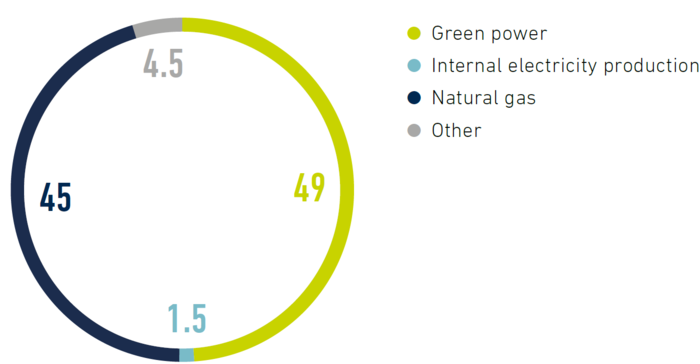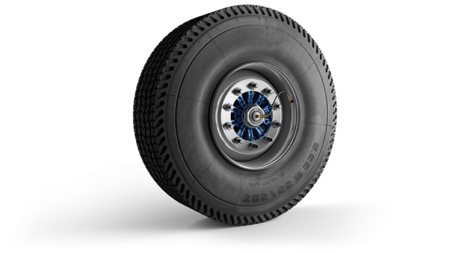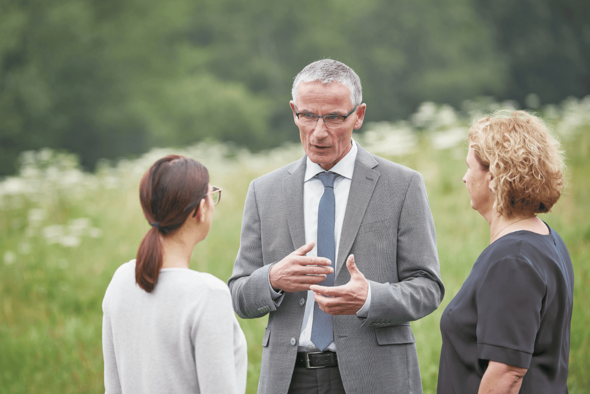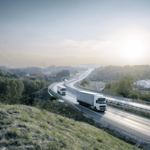Sustainability
SUSTAINABILITY AS A SYSTEM
THE TERM ECOSYSTEM HAS LONG BEEN USED TO DESCRIBE NOT ONLY NATURAL COMMUNITIES, HABITATS, BUT ALSO INTERCONNECTED, DYNAMIC ECONOMIC AND TECHNOLOGICAL SYSTEMS. ALL THREE INTERPRETATIONS ARE CORRECT – AND FORM A HOLISTIC CONTEXT AT BPW.
LESS IS MORE. THIS ALSO HELPS THE ENVIRONMENT
Everything that makes transport more economical and safer benefits humankind, the environment and the climate. Solutions from BPW aim to reduce consumption, wear, downtime, congestion and detours, noise and exhaust emissions and empty running. Year after year, BPW makes significant progress in this regard – for example through weight savings or innovations in the fields of electric transportation, load securing and connected transport. However, BPW believes its responsibility goes much further, also encompassing procurement and supplier management, assessing the energy input and environmental
impact of production over the entire life cycle of each solution, and does not even stop at the well-being of its own employees – BPW obliges its partners to comply with the highest standards of quality, environmental and climate protection,compliance and occupational safety worldwide and throughout the entire value chain.
A MULTIFACETED UNDERSTANDING OF RESPONSIBILITY
BPW’s sustainability concept is built on three pillars: employees and society,environment and energy and product responsibility. Achieving significant progress year after year in all of these areas is a task that the entire company is committed to – across all departments and hierarchical levels. BPW documents its progress year after year in a sustainability report orientated on the guidelines of the UN Global Compact – the world’s largest initiative for responsible corporate management.
A typical feature of a family-owned company like BPW is its close ties withemployees, vocational trainees and their families at the location of the company’s headquarters. BPW is one of the best vocational training firms in Germany and sets standards when it comes to equipment and talent promotion – although young people with school issues are also systematically supported. BPW is even active in nursery and primary schools in order to get even the youngest ones interested in mathematics and natural sciences.
Together with other family-owned companies, BPW is not only taking a public stand against xenophobia, but is also using its opportunities as a training company to show young people concrete ways that they can build a better world. For example, political education is part of the training programme, and this includes practical projects.
“This year, many young people have taken to the streets demanding that politicians take action to protect the climate. We teach them, on the other hand, how politics works at the local level and how they can actively get involved as responsible citizens.”
Achim Kotz
Jürgen Bremer, supply chain manager (SCM) of the BPW Group, and his team audit up to 60 BPW suppliers annually – now doing so on the basis of strict sustainability criteria. These include issues such as occupational safety, energy conservation, CSR, the Global Compact and child labour.

LEARN MORE ABOUT SUSTAINABILITY AT BPW – IN COMPANY’S THE 2019 SUSTAINABILITY REPORT
Energy consumption:
100% green power – climate-friendly natural gas

CO2 emissions drastically reduced
By switching to 100% green power and converting its fleet to electric vehicles, BPW was able to reduce its CO2 emissions by around
60%
to 7,855 tons compared with 2017.

AirSave: protects tyres, reduces CO2 emissions and eliminates accident causes
Varying cargo weights, road conditions and temperatures lead to pressure differences that rapidly wear out tyres. If a tyre actually blows out, it can have unforeseeable consequences. The new Air-Save tyre control system already pays for itself in the first year – and each year, saves
655 kilos of CO2




